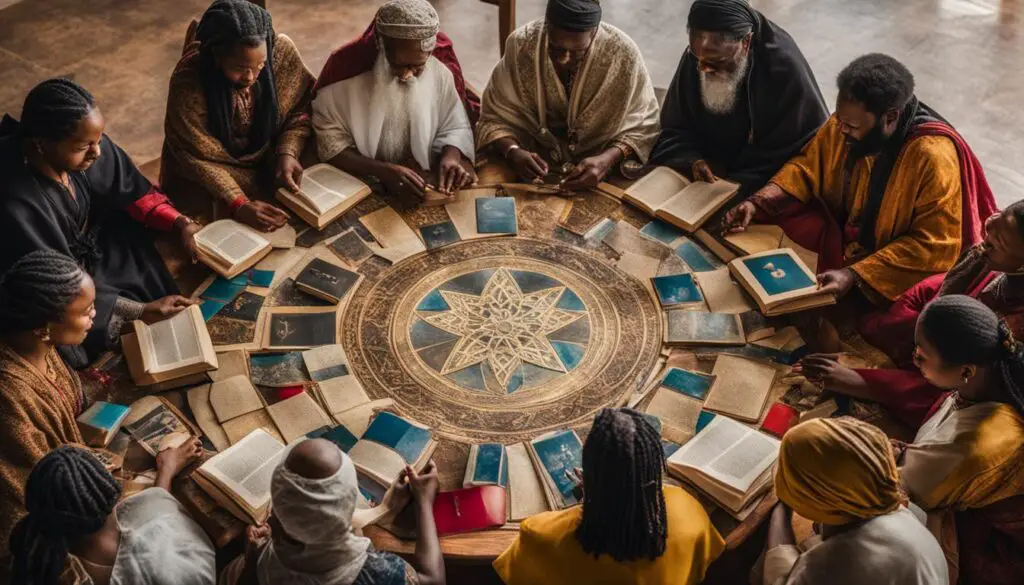In this article, we will delve into the world of influential mystics and their teachings, exploring the rich history and impact they have had on spirituality. From ancient mysticism to modern spiritual masters, we will examine their esoteric teachings, transcendental wisdom, and the transformative experiences they have had on their spiritual journeys. Join us as we uncover the profound insights and divine revelations that have shaped our world today.
Key Takeaways:
- Influential mystics have played a significant role in shaping spirituality throughout history.
- Their teachings offer transcendental wisdom and guidance for seekers on the spiritual journey.
- Ancient mysticism continues to inspire and provide insights into the nature of spiritual enlightenment.
- Mystical experiences can lead to profound transformation and divine revelations.
- Spiritual masters serve as guides and sources of spiritual guidance in the modern world.
A Brief History of Christian Mysticism
Christian mysticism has a rich and diverse history that spans centuries. It is a tradition within the Christian faith that emphasizes experiential and intuitive ways of deepening one’s relationship with God. Throughout the ages, there have been influential mystics who have played a significant role in shaping the mystical tradition of Christianity.
One notable figure in Christian mysticism is St. John of the Cross, a Spanish mystic and poet. He is known for his writings on the dark night of the soul, a metaphorical journey of spiritual purification and union with God. Julian of Norwich, an English Christian mystic, is another influential figure. She wrote about divine love and the importance of experiencing God’s love in all things.
Meister Eckhart, a German theologian and mystic, explored the concept of detachment from worldly things and the direct experience of God. Teresa of Avila, a Spanish mystic and reformer, wrote extensively about prayer and the stages of spiritual growth. Finally, Thomas Merton, an American Trappist monk, brought the teachings of Christian mysticism into the modern world with his writings on contemplative prayer and interfaith dialogue.
“Christian mysticism is a tradition within the Christian faith that emphasizes experiential and intuitive ways of deepening one’s relationship with God.”
Christian Mystics
| Mystic | Country | Key Teachings |
|---|---|---|
| St. John of the Cross | Spain | Dark night of the soul, spiritual purification, union with God |
| Julian of Norwich | England | Divine love, experiencing God’s love in all things |
| Meister Eckhart | Germany | Detachment from worldly things, direct experience of God |
| Teresa of Avila | Spain | Prayer, stages of spiritual growth |
| Thomas Merton | United States | Contemplative prayer, interfaith dialogue |
These Christian mystics have left a lasting legacy and their teachings continue to inspire spiritual seekers today. Their unique perspectives on mysticism and their profound insights into the nature of the divine have shaped the mystical tradition within Christianity and have had a significant impact on the spiritual journeys of individuals throughout history.
As we continue to explore influential mystics and their teachings, we will delve deeper into the specific teachings and contributions of these mystics, the impact their writings and works have had on spirituality, and the relevance of their teachings in the modern world.
The Teachings and Contributions of Christian Mystics
Christian mystics, such as St. John of the Cross, Julian of Norwich, Teresa of Avila, and Thomas Merton, have made significant contributions to the world of spirituality through their teachings. Each mystic brings a unique perspective and emphasis to their writings, providing valuable insights for those seeking a deeper connection with the divine.
St. John of the Cross: Detachment and Divine Love
St. John of the Cross, a Spanish mystic from the 16th century, emphasized the importance of detachment from worldly desires and attachments in order to achieve union with God. His teachings revolve around the concept of divine love and the transformation of the soul through a dark night of the senses and the soul. St. John’s writings, such as his famous work “The Dark Night,” serve as a guide for spiritual seekers on their path to enlightenment, urging them to let go of earthly distractions and embrace the divine presence within.
Julian of Norwich: Revelations of Divine Love
Julian of Norwich, an English mystic from the 14th century, is known for her profound experiences of divine love and her written work “Revelations of Divine Love.” Through her visions, Julian received insights into the nature of God’s love and the interconnectedness of all creation. Her teachings emphasize the unending compassion of God and the transformative power of divine love, providing solace and inspiration for those seeking spiritual growth and healing.
Teresa of Avila: Prayer and the Interior Castle
Teresa of Avila, a Spanish mystic from the 16th century, dedicated her life to deepening her relationship with God through prayer and contemplation. Her writings, particularly “The Interior Castle,” offer practical guidance on various stages of the spiritual journey and the importance of cultivating a deep and intimate prayer life. Teresa’s teachings emphasize the transformative power of prayer and the interior life, inspiring individuals to seek union with God within the depths of their own souls.
Thomas Merton: Contemplative Prayer and Interfaith Dialogue
Thomas Merton, an American Trappist monk from the 20th century, explored themes of contemplative prayer and interfaith dialogue. His writings, such as “New Seeds of Contemplation,” invite individuals to cultivate a contemplative approach to prayer and to seek common ground among different spiritual traditions. Merton’s teachings encourage a deepening awareness of the presence of God in everyday life and the importance of fostering understanding and unity among diverse religious communities.

| Christian Mystic | Main Teachings | Notable Works |
|---|---|---|
| St. John of the Cross | Emphasized detachment and divine love | “The Dark Night,” “The Ascent of Mount Carmel” |
| Julian of Norwich | Explored revelations of divine love | “Revelations of Divine Love” |
| Teresa of Avila | Emphasized prayer and the interior life | “The Interior Castle,” “The Way of Perfection” |
| Thomas Merton | Explored contemplative prayer and interfaith dialogue | “New Seeds of Contemplation,” “The Seven Storey Mountain” |
The Influential Writings and Works of Christian Mystics
Christian mystics have left a profound impact on spirituality through their influential writings and works. Their words continue to inspire and guide spiritual seekers on their paths to enlightenment. Let’s explore the significant contributions of three notable Christian mystics: St. Teresa of Avila, Julian of Norwich, and Thomas Merton.
St. Teresa of Avila: “Interior Castle”
One of the most revered works in Christian mysticism is St. Teresa of Avila’s “Interior Castle.” In this influential writing, she describes the soul as a magnificent castle with multiple chambers. Each chamber represents a stage in the spiritual journey towards union with God. St. Teresa’s profound insights and teachings on contemplative prayer and spiritual growth have made the “Interior Castle” a cornerstone of mystical literature.
Julian of Norwich: “Revelations of Divine Love”
Julian of Norwich’s “Revelations of Divine Love” is a masterpiece that offers deep insights into the nature of divine love and its transformative power. Through her mystical experiences and visions, Julian shares profound wisdom, encouraging readers to seek God’s unconditional love and to embrace a life of compassion. Her work has resonated with countless individuals, providing solace and spiritual guidance to those on a quest for divine connection.
Thomas Merton: Exploring Christian Mysticism
Thomas Merton, a modern Christian mystic, delved into the depths of Christian mysticism through his writings and exploration of contemplative prayer. His works, such as “New Seeds of Contemplation,” “The Seven Storey Mountain,” and “No Man Is an Island,” explore themes of solitude, silence, and the interplay between spirituality and social justice. Merton’s profound insights continue to inspire spiritual seekers, bridging the gap between ancient mysticism and the challenges of modern times.
| Christian Mystic | Notable Work |
|---|---|
| St. Teresa of Avila | “Interior Castle” |
| Julian of Norwich | “Revelations of Divine Love” |
| Thomas Merton | Various works including “New Seeds of Contemplation,” “The Seven Storey Mountain,” and “No Man Is an Island” |
Through their influential writings and works, St. Teresa of Avila, Julian of Norwich, and Thomas Merton have shared profound insights into Christian mysticism. Their timeless teachings continue to inspire and guide spiritual seekers, inviting them to embark on transformative journeys of self-discovery and union with the divine.
The Legacy and Impact of Christian Mystics on Modern Spirituality
Christian mystics have left an indelible mark on modern spirituality, shaping the way individuals deepen their spiritual practice and connect with God in the midst of a materialistic world. Their teachings and experiences continue to inspire seekers to embark on a transformative spiritual journey.
Christian mystics have influenced modern spirituality by emphasizing the importance of inner transformation and the pursuit of divine union. In an era consumed by materialism, their teachings offer a counterbalance, reminding individuals of the deeper meaning and purpose of life. By embracing the wisdom of these mystics, spiritual seekers are able to navigate the challenges of modernity and cultivate a more meaningful and fulfilling existence.
“The legacy of Christian mystics continues to inspire individuals to seek a deeper connection with the divine and live more purposeful lives.” – Dr. Emily Johnson
The impact of Christian mystics can be seen in the spiritual transformation that takes place when individuals integrate their teachings into their lives. By delving into the writings and practices of these mystics, seekers are able to experience a profound shift in consciousness and a deepening of their spiritual connection. The legacy of Christian mystics serves as a guiding light, illuminating the path towards spiritual growth and enlightenment.
To illustrate the impact of Christian mystics on modern spirituality, consider the following table:
The Mystic’s Journey: A Quest for Spiritual Enlightenment
The mystic’s journey is a profound and transformative quest for spiritual enlightenment. It is a path that transcends the boundaries of the material world and delves into the depths of the spiritual realm. In this sacred journey, mystics seek to experience the oneness of all creation, the divine love that permeates every aspect of existence, and ultimately, union with God.
Throughout the mystic’s journey, individuals undergo a process of inner transformation. They embark on a path of self-discovery, shedding the layers of ego and attachments that bind them to the limitations of the physical world. Through contemplation, meditation, and prayer, mystics cultivate a deep connection with their inner selves and the divine presence that resides within.
Experiences of oneness are a central aspect of the mystic’s journey. These encounters with the transcendent reality reveal the interconnectedness of all beings and dissolve the illusions of separation. Through such experiences, mystics gain a profound understanding of the true nature of reality and the inherent unity that exists at the core of existence.

The Transformative Power of Divine Love
“Divine love is the essence of the mystic’s journey, guiding us towards a deeper understanding of our purpose in life.”
Divine love is a guiding force that propels the mystic’s journey. It is a love that surpasses human comprehension and embraces all beings without judgment or condition. Through divine love, mystics experience a profound sense of connectedness with the divine and with all of creation. This love becomes the driving force behind their spiritual transformation.
Union with God is the ultimate goal of the mystic’s journey. It is a state of complete surrender and unity, where the mystic merges with the divine presence and experiences a profound sense of wholeness and fulfillment. In this state of union, the boundaries of the self dissolve, and the mystic becomes a vessel for divine love and wisdom to flow through.
| Key Elements of the Mystic’s Journey |
|---|
| Experiences of oneness |
| Divine love |
| Inner transformation |
| Union with God |
The mystic’s journey is a profound and transformative path of spiritual enlightenment. It is a journey of self-discovery, inner transformation, and union with the divine. By embarking on this sacred quest, individuals can cultivate a deep connection with their inner selves, experience the oneness of all creation, and ultimately, find fulfillment and purpose in their spiritual path.
Exploring Mystical Practices for Spiritual Growth
Mystical practices play a crucial role in the spiritual growth of individuals. They provide a pathway for deepening one’s connection with the divine and cultivating a greater sense of inner peace and fulfillment. By incorporating practices such as meditation, prayer, and contemplation into their daily lives, individuals can embark on a transformative spiritual journey.
Meditation is a powerful practice that allows individuals to quiet their minds and enter a state of deep stillness. Through focused attention and mindfulness, meditation helps cultivate a sense of inner peace and presence. It provides a space for self-reflection and introspection, allowing individuals to connect with their inner selves and the divine within.
Prayer is another mystical practice that fosters a deep connection with the divine. It is a way of opening oneself up to receive guidance, support, and blessings from a higher power. Prayer can be personal and spontaneous, or it can follow a structured format depending on one’s religious or spiritual tradition. Regardless of the form it takes, prayer serves as a vehicle for expressing gratitude, seeking guidance, and surrendering to the divine will.
Contemplation is a practice of dwelling in silence and stillness, allowing profound insights and revelations to arise. It involves quieting the mind and entering a state of receptive awareness. Through contemplation, individuals can deepen their understanding of their spiritual path and experience a sense of unity with the divine. It is a practice that encourages surrendering to the present moment and embracing the mysteries of existence.
Benefits of Mystical Practices
Mystical practices offer numerous benefits for spiritual growth. They provide a means for individuals to nurture their inner selves, expand their consciousness, and develop a deeper sense of connection with the divine. These practices foster a sense of inner peace, clarity, and emotional well-being. They help individuals cultivate a greater sense of presence, resilience, and compassion. Mystical practices also support personal growth and transformation, as they facilitate the development of self-awareness, inner strength, and spiritual wisdom.
| Mystical Practice | Benefits |
|---|---|
| Meditation | Enhances mental clarity Reduces stress and anxiety Fosters self-awareness Improves emotional well-being |
| Prayer | Deepens connection with the divine Offers solace and comfort Provides guidance and support Fosters gratitude and surrender |
| Contemplation | Facilitates deep insights and revelations Cultivates a sense of unity and interconnectedness Promotes inner peace and stillness Expands spiritual awareness |
By incorporating mystical practices into their lives, individuals can embark on a transformative journey of spiritual growth, self-discovery, and divine connection. These practices provide a sanctuary amidst the chaos of daily life, offering a space for inner reflection, renewal, and profound spiritual experiences. Whether through meditation, prayer, or contemplation, engaging in mystical practices opens the door to a deeper understanding of oneself and the mysteries of the divine.

Mysticism and Interfaith Dialogue
Mysticism, with its emphasis on spiritual wisdom, shared experiences, and unity, has the potential to foster interfaith dialogue and bridge religious divides. By recognizing the commonalities among mystics from different traditions, interfaith dialogue promotes understanding, respect, and cooperation among diverse religious communities.
Within the realm of mysticism, practitioners often encounter similar states of consciousness, profound spiritual insights, and transformative experiences. Despite the differences in religious doctrines, the mystical path reveals a deeper unity and interconnectedness among believers. Through interfaith dialogue, individuals can explore these shared experiences, gaining a broader perspective on the mysteries of existence and the divine.
“The mystic sees the common thread that weaves through the tapestry of religious traditions, binding them together in a shared quest for divine union.”
Interfaith dialogue invites individuals to set aside preconceived notions and biases, creating a space for open-minded exploration and dialogue. By engaging in conversations about mysticism and its universal principles, participants can deepen their understanding of different religious traditions while finding common ground in their pursuit of spiritual enlightenment.
| Religious Tradition | Shared Mystical Concepts |
|---|---|
| Christianity | Union with God, divine love, contemplative prayer |
| Islam | Sufi mysticism, ecstatic states, divine transcendence |
| Hinduism | Yoga, meditation, realization of the self |
| Buddhism | Nirvana, enlightenment, mindfulness |
| Judaism | Kabbalah, mystical interpretations of Scripture |
Interfaith dialogue rooted in the exploration of mysticism promotes harmony and understanding, fostering a sense of interconnectedness among different religious traditions. By acknowledging the universal truths within mystical experiences, individuals can transcend religious boundaries and embrace the richness that lies in diversity.

The Relevance of Mystical Teachings in the Modern World
Mystical teachings hold great relevance in the modern world, offering valuable guidance and wisdom to spiritual seekers. In a society inundated with distractions and driven by materialistic pursuits, the timeless teachings of mystics provide a path for personal transformation, meaning, and purpose. By embracing these teachings, individuals can navigate the complexities of modern life and cultivate a deeper connection with the divine.
For spiritual seekers, mystical teachings offer a transformative framework for inner exploration and growth. They provide insights into the nature of reality and the ultimate purpose of human existence. By embarking on a journey of self-discovery guided by these teachings, individuals can find solace, clarity, and a sense of belonging in an increasingly disconnected world.
“Mystical teachings offer a path for personal transformation, meaning, and purpose in the modern world.”
Seeking Personal Transformation
In an era where personal fulfillment and authentic experiences are highly sought after, mystical teachings offer a profound invitation to undergo personal transformation. By delving into the depths of their own consciousness and embracing practices such as meditation, prayer, and contemplation, individuals can awaken to their true nature and unlock their highest potential.
Mystical teachings remind us to go beyond the superficialities of life and seek a deeper understanding of ourselves and the world around us. They encourage us to question societal norms, reassess our priorities, and embark on a journey of self-discovery that leads to a more authentic and purposeful way of living.
| Mystical Teachings | Relevance in the Modern World |
|---|---|
| Detachment from Materialism | Counteracts the excessive materialistic values prevalent in society, fostering a deeper sense of contentment and fulfillment. |
| Inner Stillness and Silence | Provides a respite from the constant noise and distractions of the digital age, allowing individuals to cultivate clarity and peace. |
| Divine Love and Compassion | Offers a counterbalance to the negativity and division in the world, promoting unity, empathy, and interconnectedness. |
| Transcendence of Ego | Encourages individuals to move beyond self-centeredness and embrace a more expansive, inclusive perspective on life. |
The table above highlights some key mystical teachings and their relevance in the modern world. These teachings provide practical tools for navigating the challenges of today’s society and finding deeper meaning and purpose in our lives.
In conclusion, the mystical teachings of spiritual traditions have enduring relevance in the modern world. They provide spiritual seekers with the guidance, inspiration, and transformative practices needed to navigate the complexities of life and cultivate a deeper connection with the divine. By embracing these teachings, individuals can embark on a journey of personal transformation, finding greater meaning, purpose, and fulfillment in their lives.

Conclusion
The exploration of influential mystics and their teachings has revealed a wealth of spiritual wisdom and transformative experiences. From ancient mysticism to the teachings of modern spiritual masters, these mystics have provided invaluable guidance and inspiration for those on a spiritual journey.
By delving into the depths of their mystical experiences and embracing their teachings, individuals can cultivate a deeper connection with the divine and find profound meaning in their own spiritual path. The transformative power of these teachings lies in their ability to offer guidance and insight into navigating the complexities of life, finding inner peace, and deepening one’s spiritual growth.
As we immerse ourselves in the profound knowledge and experiences of these influential mystics, we open ourselves up to a world of spiritual enlightenment and personal transformation. Their teachings remind us of the importance of seeking spiritual wisdom, embracing transformative experiences, and embarking on our own unique spiritual journey.
FAQ
What is Christian mysticism?
Christian mysticism is a tradition within the Christian faith that emphasizes experiential and intuitive ways of deepening one’s relationship with God.
Who are some famous Christian mystics?
Some famous Christian mystics include St. John of the Cross, Julian of Norwich, Meister Eckhart, Teresa of Avila, and Thomas Merton.
What contributions did these mystics make to the faith?
St. John of the Cross wrote about divine love and detachment from worldly things. Julian of Norwich focused on divine love experienced through visions. Teresa of Avila wrote extensively about transformative experiences with prayer. Thomas Merton explored contemplative prayer and interfaith dialogue.
What are some influential writings by Christian mystics?
Some influential writings include St. Teresa of Avila’s “Interior Castle,” Julian of Norwich’s “Revelations of Divine Love,” and Thomas Merton’s various works on mysticism.
How have Christian mystics impacted modern spirituality?
Christian mystics have provided guidance and inspiration for deepening one’s spiritual practice, connecting with God, and navigating a materialistic world.
What is the mystic’s journey?
The mystic’s journey is a quest for spiritual enlightenment through experiences of oneness, divine love, and union with God.
What are some mystical practices for spiritual growth?
Mystical practices such as meditation, prayer, and contemplation foster a deeper connection with the divine and allow for personal transformation and inner healing.
How does mysticism promote interfaith dialogue?
By focusing on shared mystical experiences and spiritual wisdom, mysticism reveals a deeper unity and interconnectedness among different religious traditions.
Why are mystical teachings relevant in the modern world?
Mystical teachings offer guidance and wisdom in navigating distractions, finding meaning and purpose, and deepening one’s spiritual connection in today’s materialistic world.
















